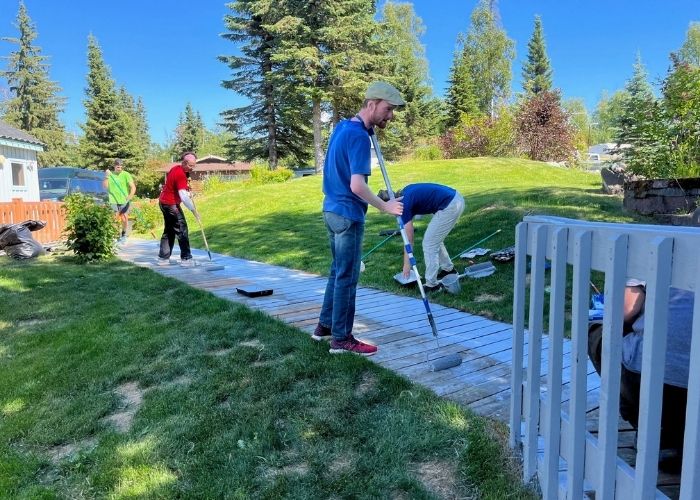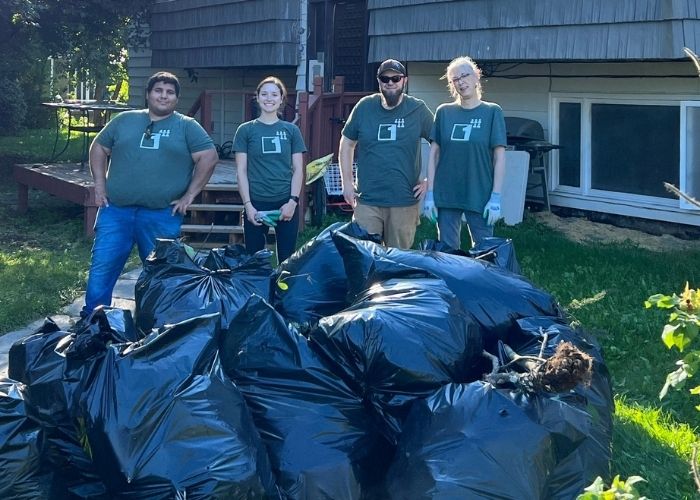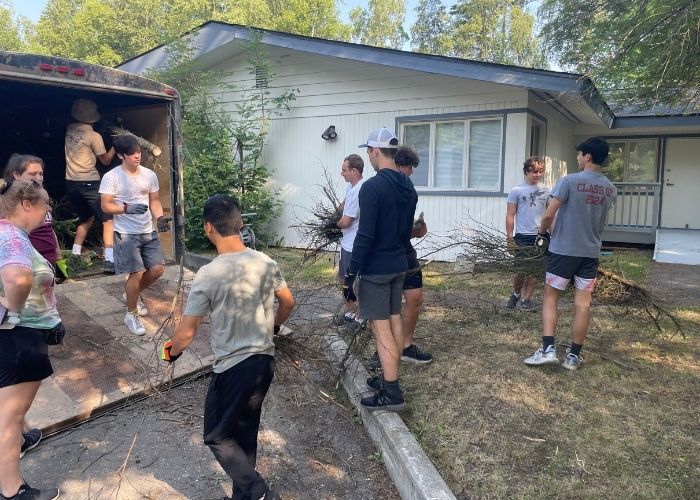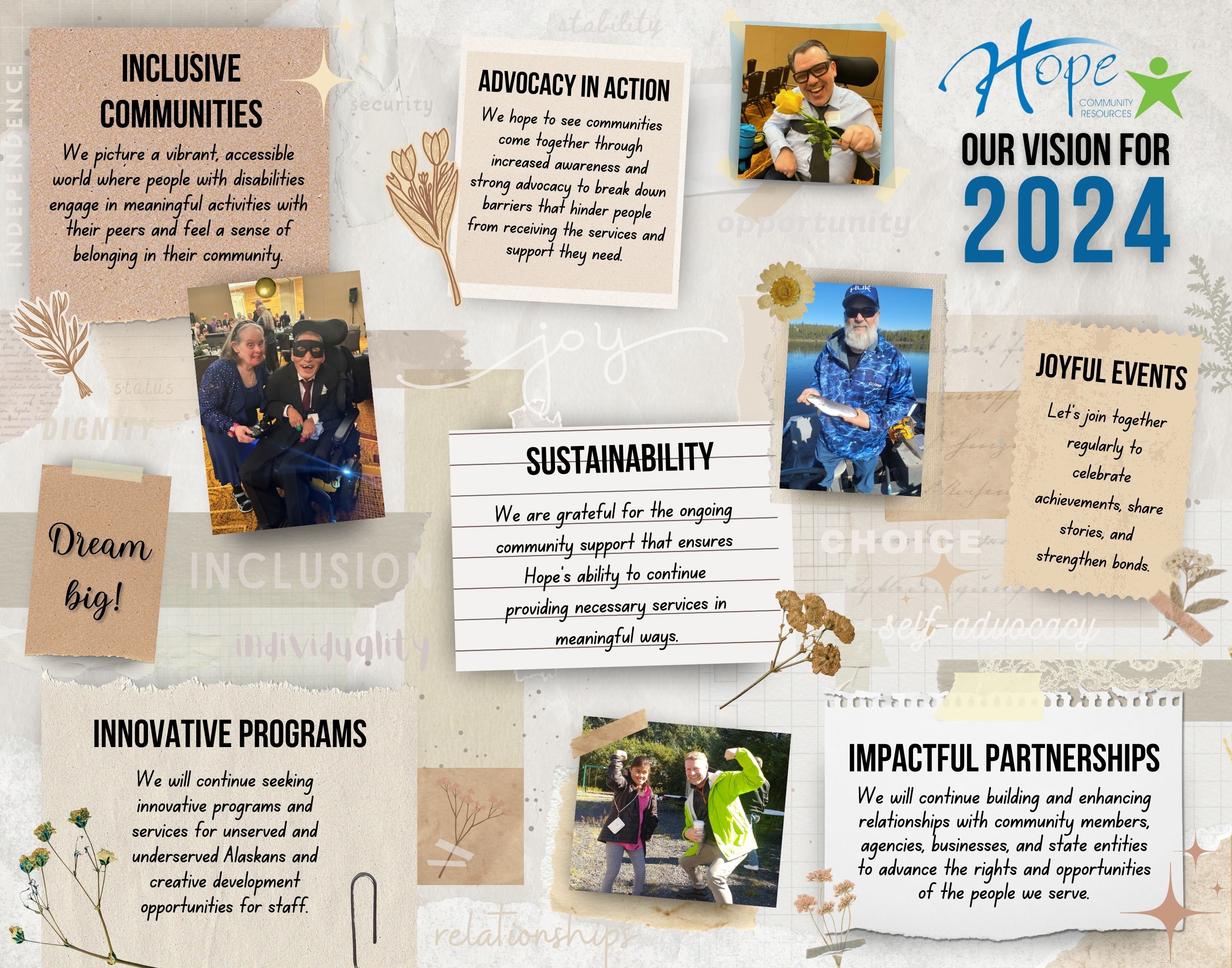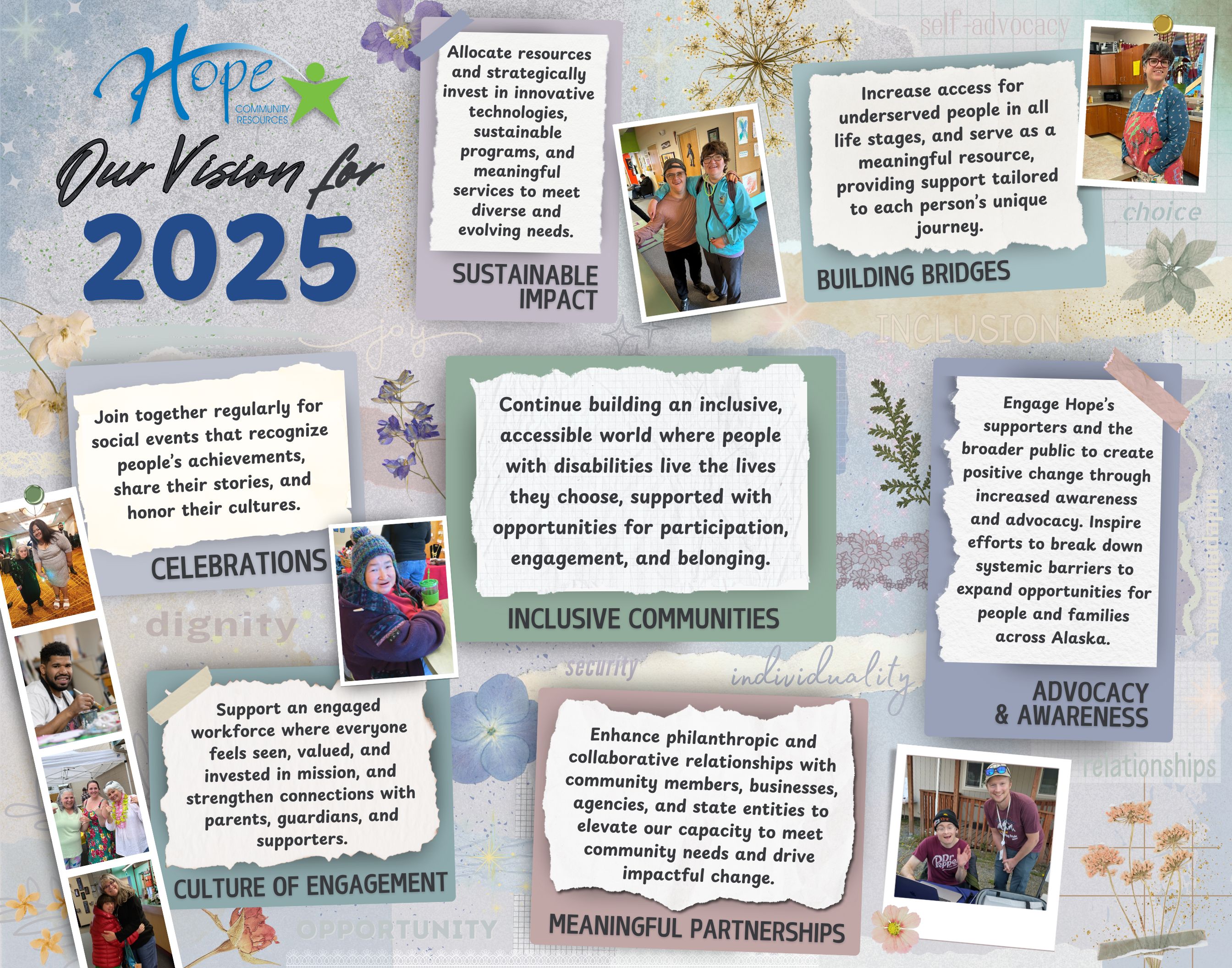The 2020s
It takes a Village to Build Hope
A Change in Leadership
Honoring the Past, Embracing the Future
Roy Scheller
With hearts full of admiration and gratitude, we celebrated the lasting legacy of Dr. Roy Scheller and his 42 years of investment in Hope and its mission. Roy retired in January 2020, leaving behind a legacy of dynamic leadership and a corporate culture that continued to guide the organization into the future.
For more than three decades, Roy partnered with former Executive Director Steve Lesko, transforming Hope from a small agency into the largest non-profit in Alaska supporting people with disabilities. Their shared vision of value-driven supports had a tremendous impact on thousands of lives.
After Steve’s departure, Roy took the helm as Executive Director and, over the following five years, became a key driver at the state level, influencing legislation and policy that benefited individuals and families in directing their own services and supports.
Known as an “agitator,” Roy was never satisfied with the status quo—always looking toward the horizon for emerging trends and steering the agency accordingly. As an innovator and supporter of dreams, he played a central role in the creation of Hope’s Outdoor Pursuits program, Hope Studios, and the intentional communities in Willow and Kenai. At the time, each of these programs was unique within Alaska and groundbreaking in the field of disability services.
Roy also established a student volunteer program with national and international reach, spreading Hope’s corporate culture and fostering positive change for people with disabilities around the world.
Words could not fully express the gratitude all of us at Hope felt for Roy and the commitment he made to the agency—and especially to the individuals and families we served—over four decades. That gratitude continued to live on in our actions and our dedication to carrying forward his legacy. We wished him joy and adventure in the years ahead, along with many opportunities to continue his investment in the people of Alaska.
Michele Girault
With Roy’s retirement, Hope welcomed Michele Girault as its new Executive Director—a leader whose journey is rooted in direct support and decades of dedication to the organization. Originally from Colorado and raised in a family of educators, Michele’s career in disability services began unexpectedly when a friend invited her to work at a small institution in San Jose, California. What started as a short-term job quickly became a calling.
After visiting Alaska in 1984 and falling in love with its people and landscapes, Michele joined Hope as a Resource Specialist. Over the next several decades, she served in many roles with a wide range of responsibilities, and took on the role of Hope's Executive Director in January 2020, and on August 20, 2024, celebrated 40 years with the agency.
Michele brings to her leadership a blend of compassion, experience, and advocacy. Her educational background in Human Development and Organizational Management, combined with her longstanding service on the boards of the Key Coalition of Alaska and Friends of Pets, reflects her commitment to people, community, and justice. At home in Anchorage with her husband Chuck—whom she met in San Jose—and their many beloved pets over the years, Michele also extended her care beyond the workplace. She maintained lifelong relationships with two individuals she once supported in California, becoming their guardian and helping them move to Alaska to build thriving, full lives.
Michele leads with her passion for inclusion, dignity, and advocacy. Her journey from direct support to CEO embodies Hope’s values, and under her guidance, the organization continues to grow while staying true to its mission. Her impact is felt by those she leads and those Hope serves, and her vision inspires all who share in this work.
Navigating a Global Pandemic
When the COVID-19 pandemic began spreading globally, Hope faced unprecedented challenges that demanded swift adaptation and innovation. The organization had just welcomed a new Executive Director, and what began as a year of promise quickly became a test of resilience. Leadership, staff, and community members came together to rethink how essential services could be delivered while keeping people safe, healthy, and connected.
When "hunker down" orders were issued, the timing coincided with the end of Alaska’s long winter—just as people were beginning to stretch their legs and reconnect outdoors. In response, Hope leaned into the beauty of its surroundings, encouraging safe adventures through accessible parks, trails, and outdoor spaces. Nature became a lifeline for many, offering freedom and connection in the midst of restriction.
Our workforce is filled with exceptional Direct Support Professionals. Live-in teams navigated staffing shortages, updated policies, and new virtual tools, all while maintaining a full and demanding daily routine. As Alaska shut down, our tireless team overcame barriers such as getting art supplies into people’s homes, finding ways to celebrate birthdays and holidays, and connecting people with technology. They engaged those they supported in creative ways, introducing virtual events and modified in-person activities to maintain a sense of normalcy and connection.
Hope Studios, known for its year-round creative energy, quickly transitioned to remote and small-group programming. Art collaboratives moved online, and DSPs visited people’s homes to assist artists with ongoing projects. Through determination and innovation, the Hope Studios team ensured uninterrupted access to this vital creative outlet, helping people continue expressing themselves and staying connected with their peers.
Youth programming, such as that offered through the Lesko Discovery Center, also continued with thoughtful adaptations. The team implemented a rigorous mitigation plan—enhancing sanitation, using individually packaged supplies, holding events outdoors, and ensuring masks and gloves were used consistently. These efforts, though demanding, paid off. Children were able to stay active, engaged, and safe during a time when connection and routine were desperately needed.
Behind the scenes, administrative staff pivoted to remote work, and virtual learning platforms were adopted across the organization for learning, engagement, and communication. While physical distancing became the norm, Hope found creative ways to still build connection—through online art projects, virtual celebrations, outdoor meetups, and even socially distanced scavenger hunts. The organization remained focused on its mission—to keep people safe, supported, and meaningfully engaged.
"Within my first '100 days' we were in the midst of a pandemic, demanding daily innovation and adaptation to deliver supports and services while keeping our workforce and stakeholders safe and healthy. And yet, I so appreciated the opportunity to look for the silver lining behind the challenges. At the heart of resilience are moments of gratitude partnered with actions from a lens of abundance." — Michele Girault, Executive Director
As the pandemic’s economic impact deepened, Hope dealt with changes in funding and workforce challenges. Federal relief efforts helped stabilize operations and, despite a nationwide labor shortage, a committed workforce remained, upholding the values and standards that have always defined Hope. Longstanding investments in preparedness and a culture of flexibility enabled the organization to continue delivering services—even if in new and unfamiliar ways.
Throughout it all, Hope’s leaders, particularly in healthcare, provided calm and confident guidance. Medical Director Dr. William Browner and Deputy Director of Health and Wellness Jo-Anne Sullivan—both decades-long staff members—became pillars of support during the health crisis. Their leadership shaped new safety protocols, navigated medical uncertainty, and maintained peace of mind for all stakeholders. Jo-Anne’s compassionate service was recognized with a statewide nursing award, underscoring the lasting impact of her work.
As communities gradually reopened, Hope’s engagement centers and programs came back to life. Art studios welcomed participants again, creative projects resumed, and milestones were celebrated—not just for returning to pre-pandemic levels of activity, but for having endured and grown through adversity.
In every challenge, Hope finds moments of gratitude. The pandemic tested the organization’s limits but also revealed its core strengths—a devoted workforce, visionary leadership, and a community that stands together. Hope remained a steady source of support and light during one of the most difficult chapters in recent history.
Travel DSP Program
In response to ongoing staffing challenges that emerged during and after the COVID-19 pandemic, Hope developed the Travel Direct Support Professional (Travel DSP) program—a flexible and innovative solution designed to support high-need areas and provide consistent relief for live-in Resident Managers. Travel DSPs were recruited from outside Alaska and brought with them an average of 10 to 15 years of experience in the intellectual and developmental disability field, including expertise in both medical and behavioral support. These professionals provided essential services in a variety of residential settings, temporarily filling roles during staff vacations, scheduled time off, emergencies, or vacancies.
Each Travel DSP was cross-trained to work in multiple homes, offering adaptability while ensuring continuity of care. Their responsibilities included supporting individuals with daily living skills, social development, communication, and community inclusion. Many also led teams of local staff, ensuring support plans were carried out with quality and consistency. While their assignments shifted based on needs, they maintained regular, rotating schedules that allowed for stable staffing patterns across the organization.
The program proved to be a highly effective approach to maintaining service continuity and enhancing the overall quality of care. It not only filled critical staffing gaps but also brought a fresh perspective and renewed energy into Hope’s support network. Several Travel DSPs chose to make Alaska their permanent home, transitioning into full-time Resident Manager roles and becoming long-term members of the Hope community. The program's growth reflected Hope’s commitment to creative, people-centered solutions in the face of complex challenges.
Recognizing Excellence: Hope Award Recipients
Each year, members of the Hope team and community are honored across Alaska and the nation for their dedication, leadership, and impact. These awards recognize the outstanding contributions of Direct Support Professionals, volunteers, advocates, and staff who embody Hope’s mission in their work and relationships. Their achievements not only celebrate individual excellence but also highlight the strength and heart of the disability services field—and the difference one person can make.
Gena Coleman, Alaska DSP of the Year (2020)
Gena Coleman was honored as Alaska’s Direct Support Professional of the Year by ANCOR. With over two decades of service, Gena was recognized for her ability to break down barriers and create meaningful, integrated lives for those she supported. She led with integrity, mentored others with care, and made every day extraordinary for her community.
Kim Brusven, Disability Pride DSP Champion Award (2020)
Kim Brusven received the Disability Pride DSP Champion Award for her joyful and compassionate support. Known for her creativity and dedication, Kim made everyday tasks engaging and fun—even flossing teeth. Her energy and positivity enriched not only the lives of those she supported in Kenai but also her entire Hope team.
Carley Stone, MITC Amazing DSP Award (2020)
Carley Stone earned the MITC Amazing DSP Award for her work at the Lesko Discovery Center. She was instrumental in transitioning programming online and leading small outdoor groups. Carley’s creativity and adaptability helped people stay connected and engaged during uncertain times.
Tessie Bodio, Alaska DSP of the Year (2021)
Tessie Bodio was named Direct Support Professional of the Year at the Full Lives Conference. As an On-Demand Relief Home Alliance Coordinator, she supported individuals in various assisted living homes during the height of the pandemic. Tessie brought laughter, calm, and stability to every environment. Her dedication to building meaningful relationships made a lasting impact, earning praise from her supervisor and this well-deserved recognition.
Ted Kim, Rasmuson Foundation's Individual Artist Award (2022)
Ted Kim, a Hope DSP since 2005, received the Rasmuson Foundation’s Individual Artist Award for his large-scale mural work. Based in Anchorage, Ted aimed to create public murals accessible to all, independent of commissions. His belief that art can inspire and spread positivity resonated with the community. In addition to his outstanding support at Hope, Ted’s creative contributions earned him this respected and well-deserved honor.
Jena Crafton, Top 40 Under 40 (2023)
Jena Crafton was recognized as one of Alaska’s Top 40 Under 40 for her outstanding disability advocacy. A self-advocate, artist, and mentor, Jena held leadership roles across multiple statewide organizations, using her lived experience to influence policy and uplift the voices of Alaskans with disabilities.
Ann Baxter, Lifetime Achievement Award (2023)
Ann Baxter received the Lifetime Achievement Award for her extraordinary 40-year nursing career, including 33 years with Hope. As a Licensed Professional Nurse and group home supervisor, she supported people through all seasons of life, including end-of-life care. Her service embodied compassion, resilience, and an unwavering commitment to others.
Masaneh Jatta, Alaska DSP of the Year (2023)
Mas Jatta was named Alaska’s Direct Support Professional of the Year by ANCOR. A Hope team member since 2012, Mas brought deep humility, attentiveness, and joy to his work. Known for his exceptional listening and mentoring, he supported people with dignity and helped new staff embrace Hope’s mission.
Sharon Miranda, Lifetime Achievement Award (2023)
Sharon Miranda received the Lifetime Achievement Award from DVR for her advocacy and service to Alaska’s Deaf community. As Coordinator of Deaf Supports, she revitalized the Deaf Navigator program and fostered access and inclusion statewide. Her work left a lasting impact and paved the way for future Deaf leaders.
Joelene Fortin, Lifetime Achievement Award (2024)
Joelene Fortin was honored with a Lifetime Achievement Award after 40 years of service at Hope. From DSP to Resident Manager, she built lifelong bonds with those she supported. Known for creating environments of dignity and independence, Joelene exemplified the spirit of person-centered care.
Diana Medina, Alaska DSP of the Year (2024)
Diana Medina, a Lead Intensive Supports Associate, was recognized as Alaska’s Direct Support Professional of the Year by ANCOR. With Hope since 2017, Diana championed family reintegration and independence, mentoring new staff and upholding Hope’s values of choice, control, and inclusion with grace and purpose.
Katie Wadsworth, Outstanding Volunteer (2024)
Katie Wadsworth was recognized as an Outstanding Volunteer for her dedication to Hope and Hope Studios. Her creative contributions—like crafting for events—paired with her consistent support and positive energy, made her a vital part of the Studio community and an inspiration to all who work alongside her.
Momodou Mboob, Outstanding Professional of the Year (2025)
Momodou "Mo" Mboob was honored as Outstanding Professional of the Year for his leadership in mental health services in Utqiaġvik. A Hope team member since 2013, Mo provided compassionate, culturally competent care and advocated to destigmatize mental illness. His unwavering presence and advocacy brought hope to one of Alaska’s most remote communities.
Joseph Sonnier, Top 40 Under 40 (2025)
Joe Sonnier, Treasurer of Hope's Board of Directors and Director of Programs & Grants at Alaska Community Foundation, earned a spot on the Alaska Journal of Commerce’s Top 40 Under 40 list. Joe was celebrated for his leadership, innovation, and strong community commitment—recognition that reflects his professional accomplishments and dedication to improving Alaskans’ lives through thoughtful grantmaking and program development.
Alex Curry, Outstanding Community Volunteer (2025)
Alex Curry was honored as an Outstanding Community Volunteer for their dedication to Hope Studios. Volunteering up to 40 hours a week, Alex supported artists, organized events, and built strong community ties. Their creativity and consistency made them an essential part of the Studio’s success.
451 Total number of Hope employees in 2025
7 years Average length of employment of employees in 2025
3,578 Collective years served by employees in 2025
Agency Awards and Recognitions
Hope received several prestigious awards in recognition of its excellence in service, commitment to the arts, community impact, and innovation in behavioral health. These honors reflect the dedication of Hope’s staff, the strength of its partnerships, and the support from communities across Alaska.
2022: 'Best of Alaska' Assisted Living Business
Hope was awarded the Platinum Award for Best Assisted Living Business in the Anchorage Daily News Best of Alaska awards. This significant recognition was a reflection of the dedication, compassion, and professionalism of Hope’s statewide team, as well as the trust and collaboration of the individuals, families, and communities it serves. It underscored Hope’s commitment to delivering high-quality, person-centered services that promote independence, dignity, and inclusion.
2023: Governor’s Arts and Humanities Award for Arts Business Leadership
In 2023, Hope received the Governor’s Arts and Humanities Award for Arts Business Leadership, honoring the transformative impact of Hope Studios across the state. Located within the Lesko Discovery Center, Hope Studios provides inclusive access to creative expression through visual arts, skill-building workshops, and community events. The center’s Community Engagement team played a vital role in offering recreational and arts-based programming that promotes self-expression, personal growth, and meaningful connection. This statewide recognition celebrated Hope's leadership in making the arts accessible for individuals of all abilities.
2024: Top 20 Community Impact Non-Profits in Alaska
Hope was honored as one of Alaska’s Top 20 Community Impact Non-Profits, a distinction that recognized the organization’s profound and lasting influence in the lives of individuals with intellectual and developmental disabilities. Voted on by the public, this award highlighted the trust and respect Hope earned from communities across the state and acknowledged its efforts to break down barriers, foster inclusion, and improve quality of life for the people it supports.
2024: 'Best of Alaska' Behavioral & Mental Health Service Provider
Hope’s Mental & Behavioral Health team, under the leadership of Clinical Director Paul Ingram, was recognized with the Silver Award for Best Behavioral & Mental Health Services by the Anchorage Daily News. The team provided behavioral health consultations across the organization and supported the next generation of professionals through student practicum and internship placements. With a focus on personalized, trauma-informed care, Hope’s licensed therapists delivered comprehensive services tailored to the diverse needs of the individuals and families they served. This award celebrated the team’s commitment to innovation, professionalism, and compassionate care.

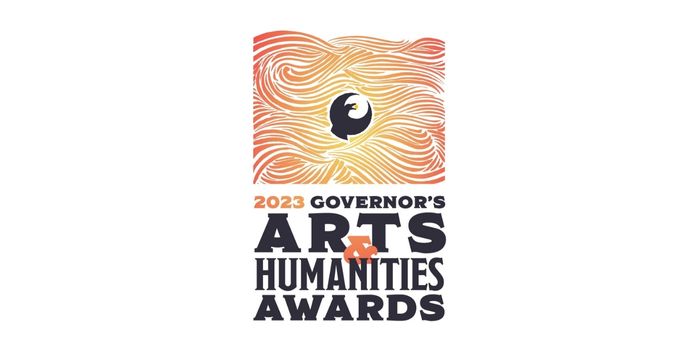
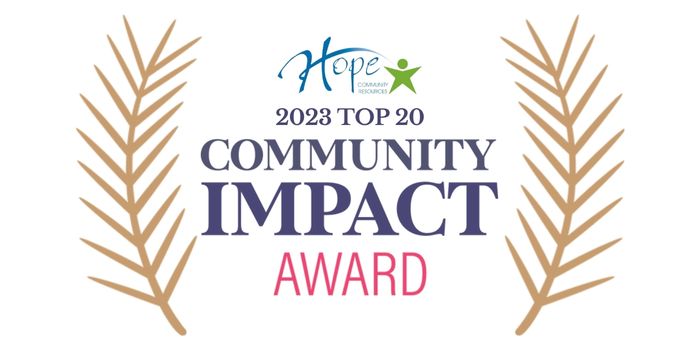
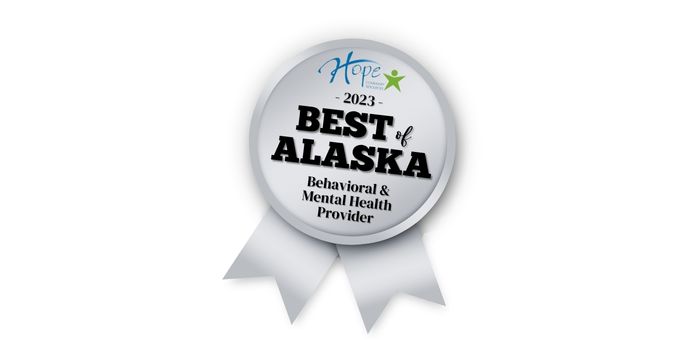
Power in Partnership
Hope has long benefited from the dedication of generous community partners. Through these partnerships, Hope’s mission is strengthened and lives are transformed. While Medicaid serves as Hope's primary funding source, Hope’s impact would not be possible without the community’s commitment to philanthropy. Contributions—through financial donations, volunteer efforts, and participation in events—help sustain and expand programs, addressing unmet needs within the disability community.
The momentum is fueled by partnerships with donors, grant funders, supporters, volunteers, employees, and community members alike. Donors and grant funders provide the resources that empower Hope to meet unserved needs. Funders provide the resources that are not funded by Medicaid and make innovation possible; supporters help amplify Hope’s reach; staff deliver meaningful, person-centered services every day. It is this collective effort that will propel Hope into a future where our shared vision of inclusivity, sustainability, and self-directed services is fully realized and celebrated.
Key Campaign
In alignment with Hope’s commitment to the outcomes of Alaska’s Shared Vision—a life of meaning, choice, and inclusion for individuals who experience disabilities—Hope remains heavily involved in statewide advocacy efforts. A central part of this commitment is active participation in the Key Campaign, an annual advocacy initiative hosted by Key Coalition of Alaska. Key Coalition of Alaska unites people with disabilities, their families, provider agencies, Care Coordinators, and frontline staff in a shared effort to improve services and outcomes. Each year, Hope team members, trust beneficiaries, family members, Direct Support Professionals (DSPs), staff, and board members represent the organization at the Capitol, including in the Senate Chambers, where they advocate for the continuation and strengthening of community-based services. Participants engage in both virtual and in-person legislative meetings, with Coalition members gathering on the Capitol steps to rally for changes such as the implementation of a waitlist eradication plan; adequate reimbursement rates to support a valued and stable workforce; the expansion of self-directed, person-centered services; expanding early intervention services; modernizing guardianship statutes; and more.
Hope’s leadership plays a significant role in Alaska’s advocacy landscape. Michele Girault, Hope’s Executive Director, serves as President of the Board for the Key Coalition of Alaska. Michael Bailey, Hope's former Deputy Executive Director, sits on the Board of the Alaska Association on Developmental Disabilities (AADD). Paul Ingram, Hope’s Clinical Director, serves on the Board of the Alaska Behavioral Health Association (ABHA). Through these roles, Hope helps influence systems-level policy and funding decisions impacting people with disabilities and those experiencing behavioral health challenges. Through sustained involvement in these advocacy coalitions, Hope helps shape a future where Alaskans of all abilities can thrive in inclusive, community-based settings—with the supports, funding, and freedom they need to live self-directed lives.
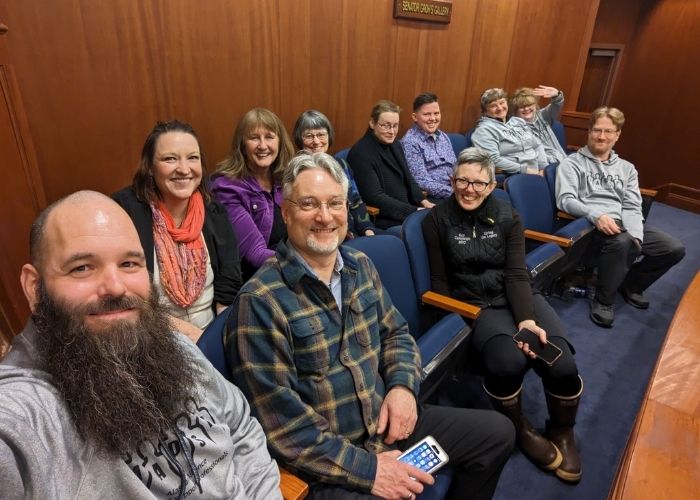
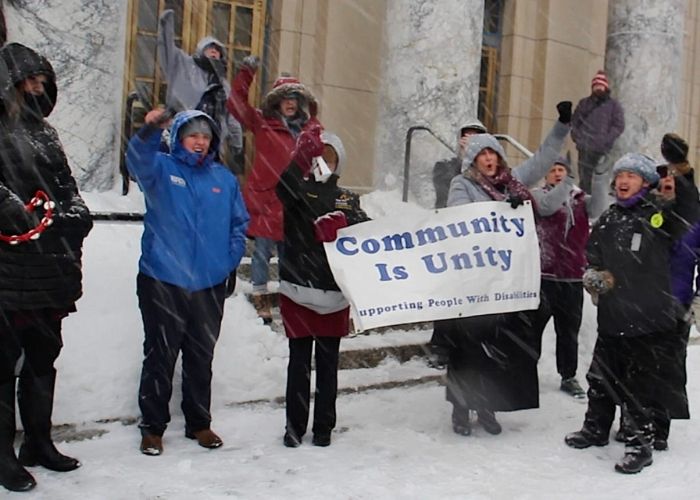
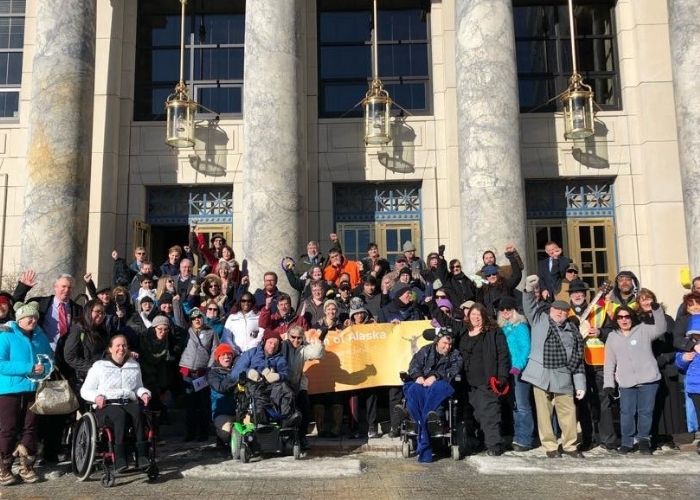
Hope Galas
In 2022, after a two-year hiatus from in-person gatherings, Hope held its Night of Hope auction in February, raising $85,000 with the help of more than 25 volunteers and 170 attendees. Hope honored the Rasmuson Foundation with the Outstanding Community Partner Award for their decades of impactful support. A piece of art created by Hope Studios artists—a dragon symbolizing protection and safety—was presented to Jeff Baird, Chief of Staff at the Foundation, in recognition of their legacy, including the leadership of the late Ed Rasmuson. The Journey Award was presented to Hope’s Willow Ranch, accepted by board member Petter Jahnsen. The Ranch was established in 2007 to provide rural, culturally meaningful living opportunities. Frank Forpahl, now the ranch manager, helped develop the community, using a person-centered, mentorship-based approach. Residents actively contribute to the daily operations, including animal care, crop harvesting, and maintenance. Their collective efforts represent the power of vision and community support.
Hope hosted another Night of Hope auction later that year, raising funds for essential programs such as accessible housing maintenance, after-school support, and emergency assistance. Dr. Phil and Annie Mabry, along with their daughter, Dr. Lara Mabry, received the Outstanding Community Partnership Award for their contributions to dental care access and their involvement in the Rainbow Connection Therapeutic Riding Program. Wayne Bodfish was recognized with the Journey Award for his decades-long role in shaping inclusive housing and support services after experiencing a childhood of isolation and minimal resources.
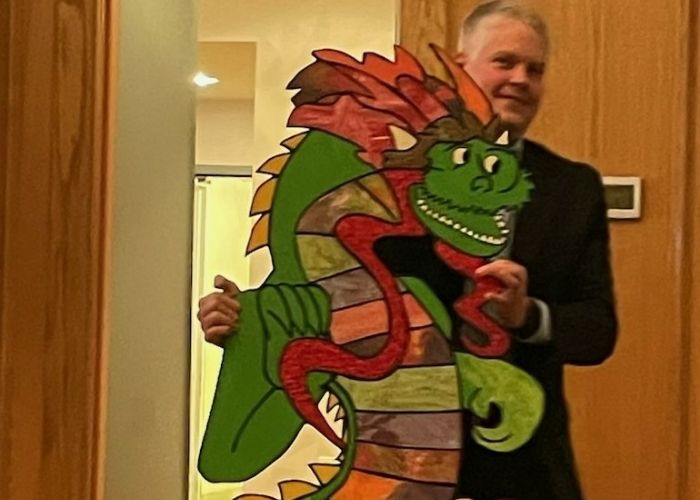
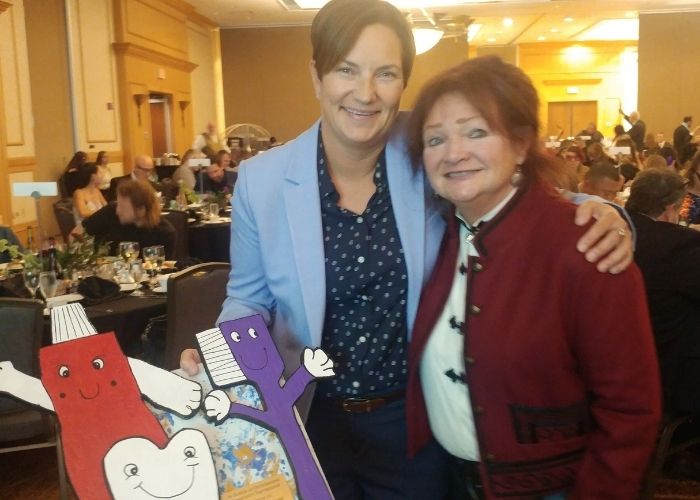
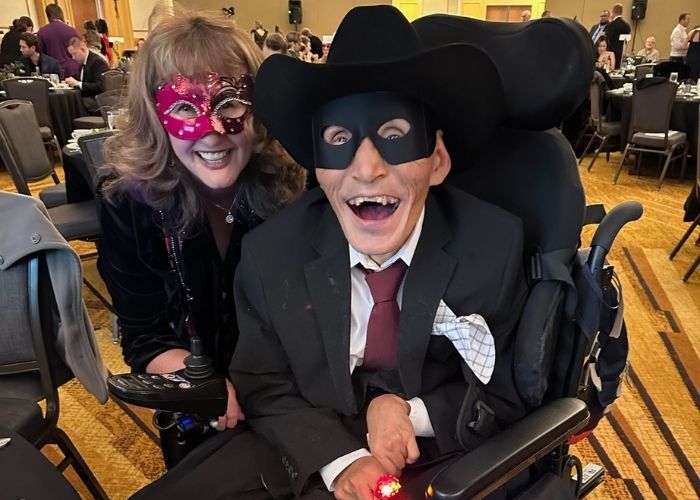
SHINE Exhibit
Also in October 2022, Hope partnered with David Jensen Photography to present the SHINE exhibit at the Anchorage Loussac Library, celebrating Down Syndrome Awareness Month. The exhibit showcased portraits of Alaskans with Down syndrome, highlighting their talents, achievements, and place in the community.
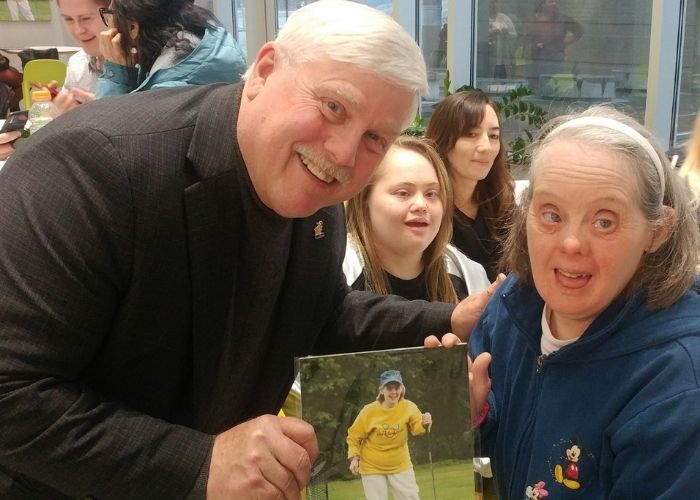
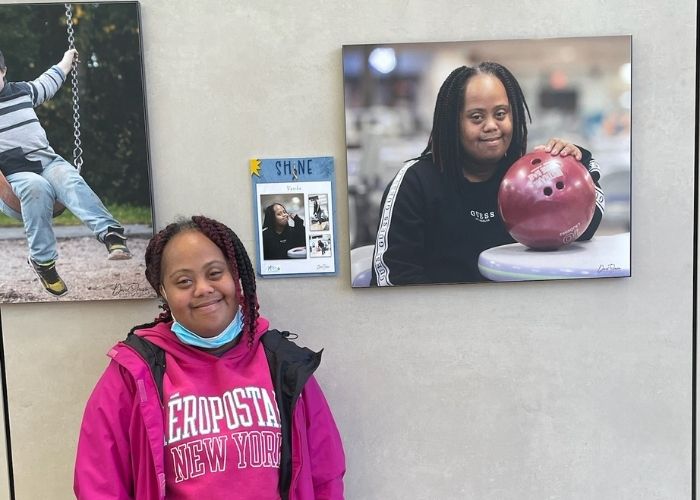
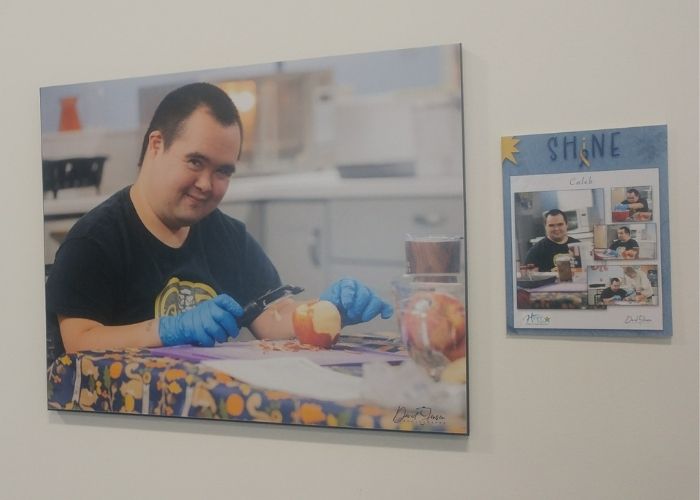
FashionPact Collaborative Mural
In November 2022, Hope’s Community Engagement Program partnered with FashionPact to bring a vibrant new symbol of unity and inclusion to the heart of Anchorage. Together, they created a colorful, community-inspired mural on the side of FashionPact’s building at 575 Ingra Street. Titled “Diversity is Beautiful,” the mural was designed to reflect the strength, beauty, and vibrancy found in diverse individuals and communities. From the earliest sketches to the final brushstrokes, the project was a true collaboration—drawing on the creativity and perspectives of those served by Hope, FashionPact team members, local artists, and community volunteers. FashionPact is an Anchorage-based, woman-owned thrift boutique founded in 2021 by Brittani Clancey. Customers who donate or shop at FashionPact get to select a local nonprofit to benefit—30–40% of each sale is directed to grassroots Alaskan charities like Hope.
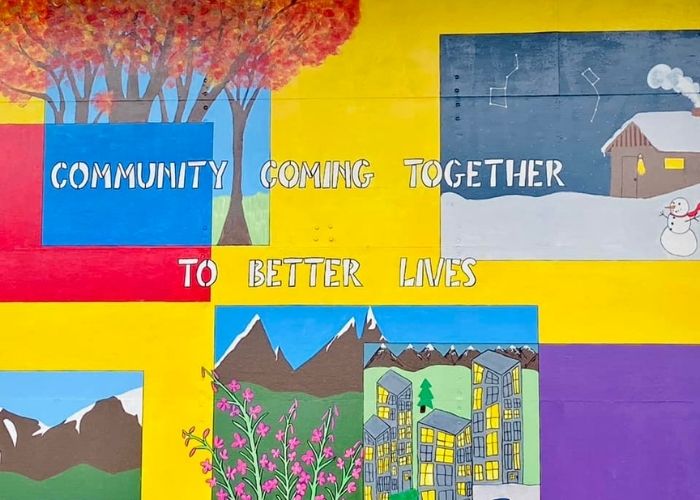
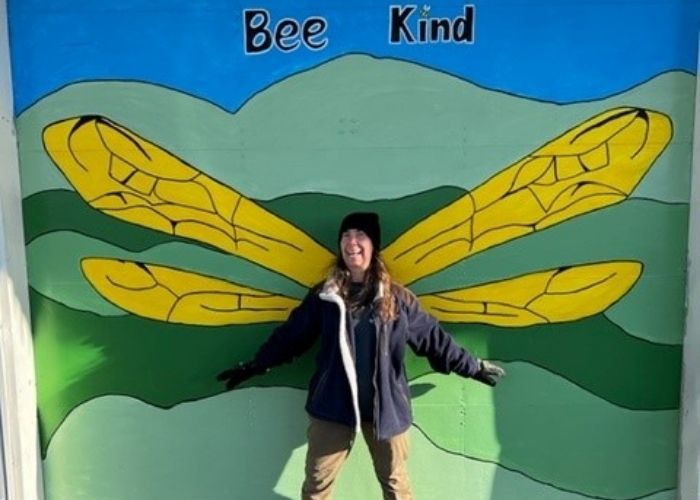
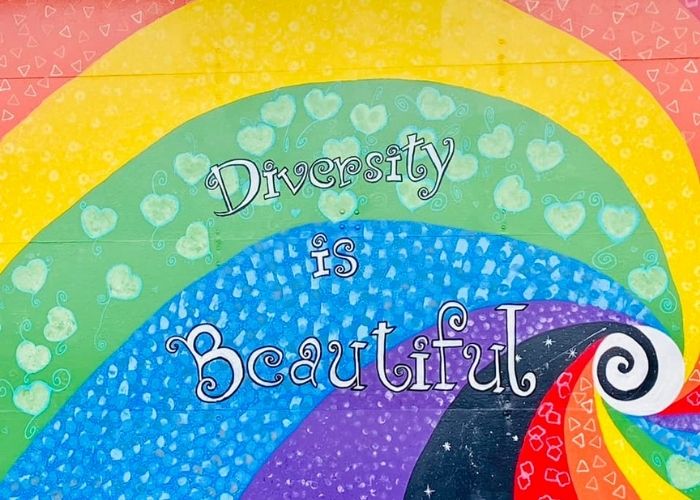
Community Engagement
Hope's Community Engagement Center has continued to expand its reach through meaningful partnerships, inclusive programming, and creative engagement across Alaska. The team partnered with the Adult Community Transition (ACT) program at the Anchorage School District to host monthly art sessions, providing students with hands-on opportunities to explore and express their creativity. In Palmer, the Hope Studios team led a collaborative wood art project at a local senior center, bringing together seniors and Hope artists to create pieces that now hang proudly in the facility’s main lobby—a lasting testament to intergenerational connection through art. The team also hosted its first in-person summer camp in three years, introduced a new photography class and community photo shoot, and coordinated a community art show in Talkeetna. A unique collaboration with Talkeetna High School allowed students and Hope artists to redesign the school’s wolf logo, blending student vision with professional creativity.
Beyond educational partnerships, Hope Studios engaged with a wide range of community organizations including the Alaska Police Department, Alaska State Fair, Raven’s Ring, and Zip Kombucha, showcasing art and building awareness. Artists also participated in events such as the Shining Abilities Craft Show, Night to Shine, YMCA Art Show, Comic Con, First Friday, Handmade Holiday Craft Fair, and Disability Pride, creating inclusive spaces for artists of all abilities to share their work and stories.
Each summer, Hope's Community Engagement Center offers a fun and inclusive Summer Camp for children and young adults with and without intellectual and developmental disabilities. Each week features trips and outings throughout the Anchorage community, such as visits to parks, nature trails, and museums. Hope has partnered with a wide variety of businesses to give campers the best experience. In 2023, Hope formed a partnership with Colorado State University, bringing one of their students to Alaska as a Camp Counselor.
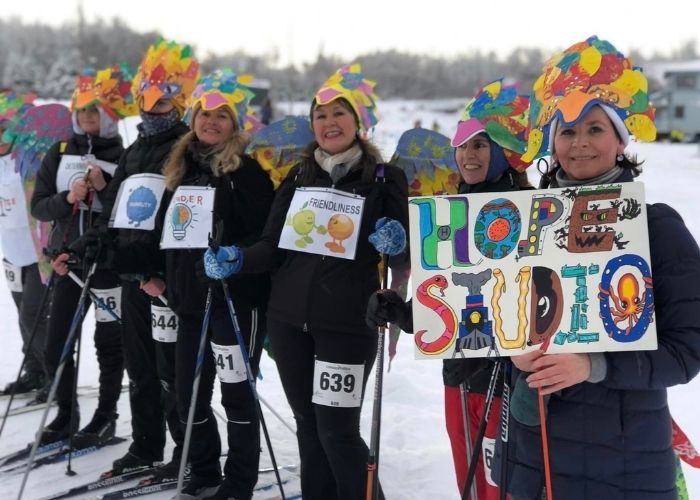
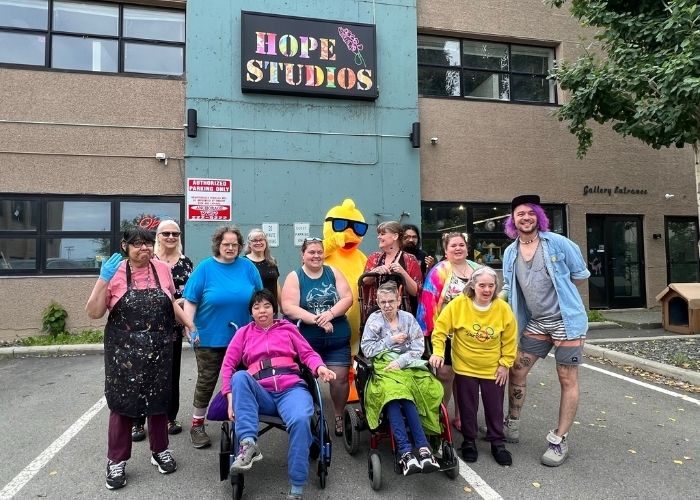
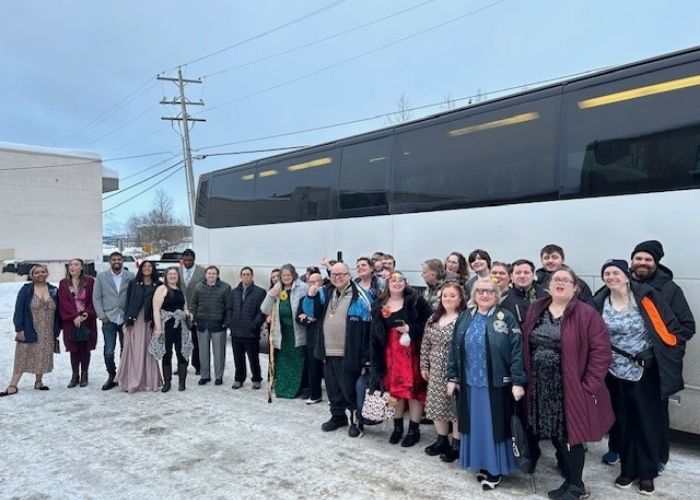
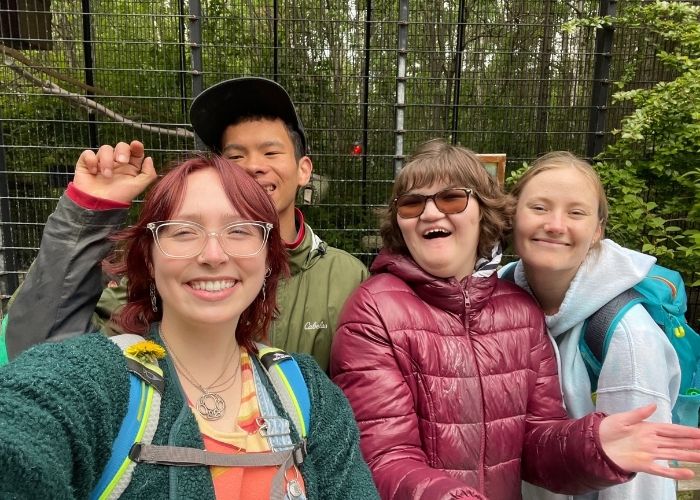
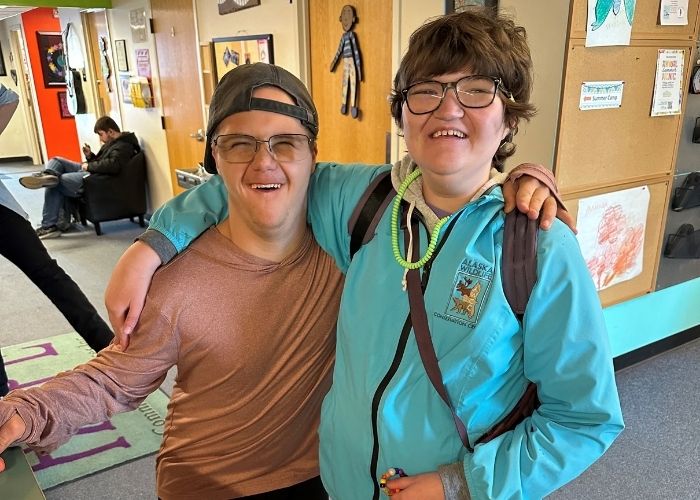
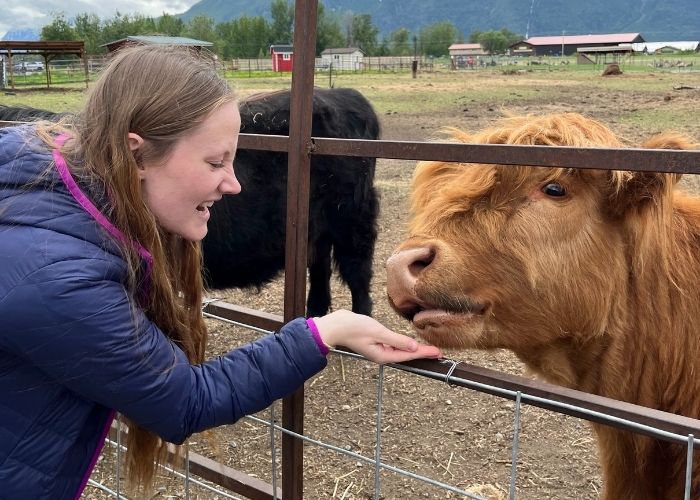
Program Partners
Our Mat-Su Special Olympics athletes brought home a range of medals. Joan took all gold and earned the overall gold, and Britaniy followed with four silver medals and gold overall. Tabitha secured silver medals and silver overall, Andrea earned a mix of gold, silver, and bronze, and Shawn earned a silver, bronze, and gold medal.
Our Deaf Supports team continues to advance Deaf awareness across Alaska through strategic outreach and education efforts. Year-round, they empower and support the Deaf and hard of hearing community, organizing social events such as community excursions, ASL meetups, and Deaf Awareness Week. They partnered with Stone Soup Group to host the inaugural Connecting Alaskan Families Equally (CAFE) conference, drawing strong support from families with Deaf and hard of hearing children. They engaged with legislators through a Lunch and Learn in Juneau and extended outreach to Nome and Cordova to strengthen community ties and promote awareness of grant programs. The team launched the Early Involvement for Deaf and Hard of Hearing Children project, which provides support and resources for families with a newly identified Deaf or hard of hearing child. In collaboration with the Southern Region EMS Council, the team developed a resource designed to facilitate communication between Deaf or hard of hearing individuals and emergency medical personnel. They have traveled to Fire Departments, EMS, and hospitals in multiple towns, including Fairbanks, North Pole, Dillingham, Unalaska, Kenai, Soldotna, Homer, Bethel, and Ketchikan, to distribute and introduce the EMS Communication Card. They trained Anchorage's Crisis Intervention Team on effective engagement with Deaf individuals and provided resources for first responders to be able to communicate with Deaf people.
Hope's Utqiagvik team serves people from the North Slope Borough who experience severe mental illnesses. It is a community initiative that promotes acceptance, ongoing social support, and participation in cultural events and native celebrations. Licensed to accommodate six adults, the home offers a range of services including behavioral health assessments, recovery support services, and case management. The home collaborates with local organizations, such as Inupiat Community of the Arctic Slope for vocational rehabilitation services and Ilisagvik College for GED classes.
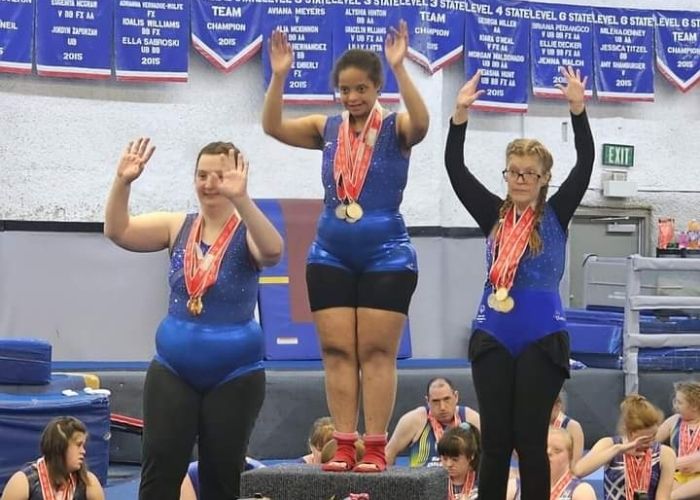
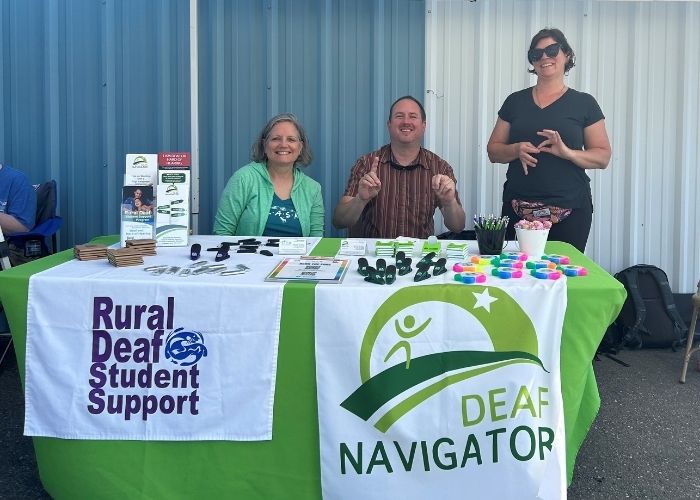
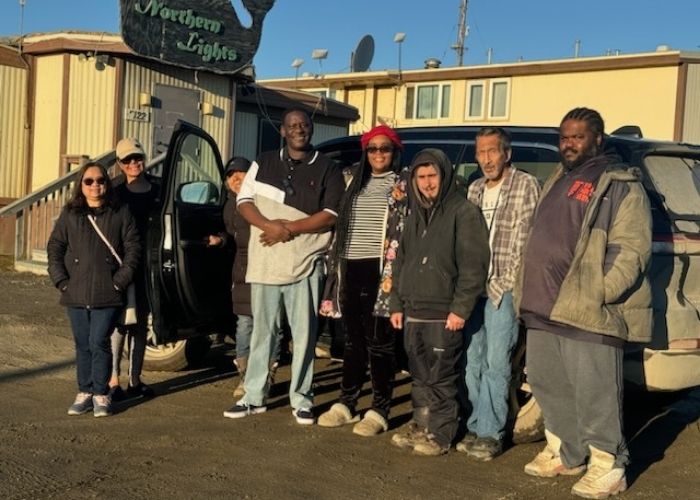
Innovative Technology
Hope partnered with Applied Microsystems to transition its computing capabilities offsite, adopting a model known as 'Infrastructure as a Service.' Applied Microsystems, a locally owned and operated small business, specializes in building and maintaining high-performance computing infrastructure for other Alaskan organizations. This collaboration allowed Hope to implement a more scalable and cost-effective approach to its technology needs, supporting long-term operational efficiency.
Around the same time, Hope initiated a major upgrade to its Human Resources Information System (HRIS) through a partnership with Ultimate Kronos Group (UKG). The new system was designed to streamline processes and improve user experience across the organization. Key features included electronic service notes, automated timecard generation, enhanced scheduling, improved internal communications, integrated HR and payroll functions, and a secure mobile application compliant with HIPAA standards.
This project marked one of the most extensive administrative collaborations in Hope’s history. Over the course of the implementation, seven departments and 23 Hope staff members worked alongside 25 vendor consultants. The effort involved the execution of 700 test cases, more than 3,400 hours of meetings, and nearly 60 hours of training—culminating in a successful system launch that significantly improved workforce tools and operational alignment.
In Grateful Memory
Throughout Hope’s history, the dedication of our Board of Directors has helped shape the foundation of our mission and the strength of our community. Several individuals have left an indelible mark through their long-standing service, leadership, and compassion.
In 2021, Hope paid tribute to Phil VanDaff and Gene Bates, two long-serving Board members whose lives reflected deep commitment to the organization. Gene retired from the board several years prior but had served faithfully for over 20 years. Phil, whose commitment to Hope spanned over four decades, was a current board member whose wit and wisdom will long be remembered and missed.
In 2024, Hope mourned the heartbreaking loss of two more long-serving Board members. Their unexpected passings left a void in our organization and our hearts, but their legacies live on and inspire us to carry on their meaningful work.
Robert “Bob” Owens served on the Hope Board of Directors for 27 years, serving in multiple leadership roles throughout that time. As an attorney, Bob shared his knowledge of the law for the organization. But his impact went far deeper because of the man he was. He walked through the world grounded in compassion and integrity, and he forged strong relationships with others. He leaves a legacy of impact, with his family, work, volunteer endeavors, and the community. Though we will forever miss his presence, we strive to follow the example he set.
Petter Jahnsen, who served on the Board since 1985 and worked in the banking and investment fields, provided wise counsel and guidance to Hope on market trends. His true passion, however, lay in Hope's programs, and in addition to serving in officer roles, he led the Programs, Practice, and Personnel committee for many years, fondly calling the members, “The fun bunch.” Petter brought light to every room he entered. Although his presence will be forever missed, his impact will live on through all the lives he has touched during his years of humble service.
Each of these leaders played a vital role in advancing Hope’s mission and strengthening its community. Their lives and legacies are a reminder of the profound impact that dedicated individuals can have—and the enduring power of service.
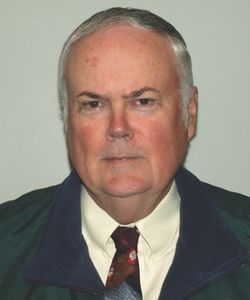
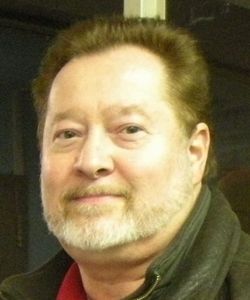
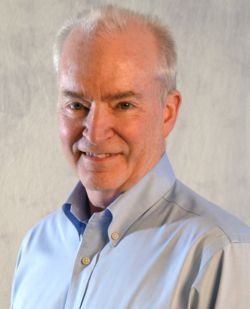
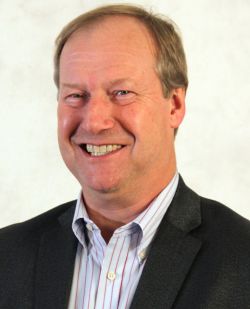
Honoring our Communities through Remembrance
Hope's teams thoughtfully created two memorial walls to honor the memory of support recipients, staff members, Board members, families, and other stakeholders who have passed away.
Remembering and honoring those who have passed is very important. The idea of a memorial wall took shape several years ago and came to fruition in 2022 with a beautiful installation created by Hope Studios. This “visual garden,” which is located in Hope's main administrative building in Anchorage, pays tribute to a broad circle of stakeholders. The butterflies were individually painted by Hope Studios artists, and each one is unique.
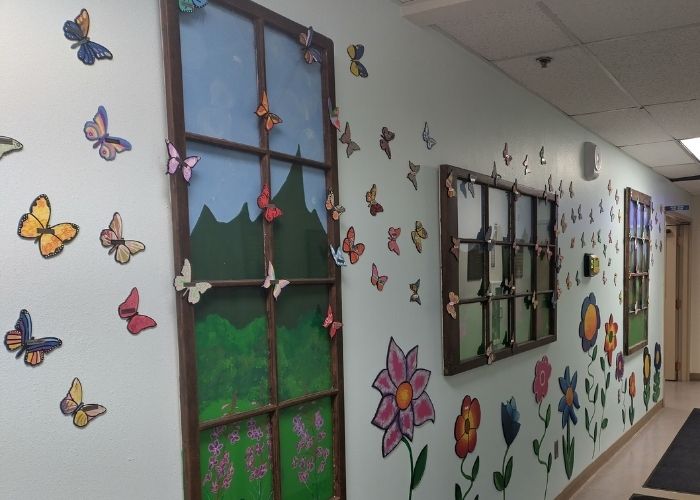
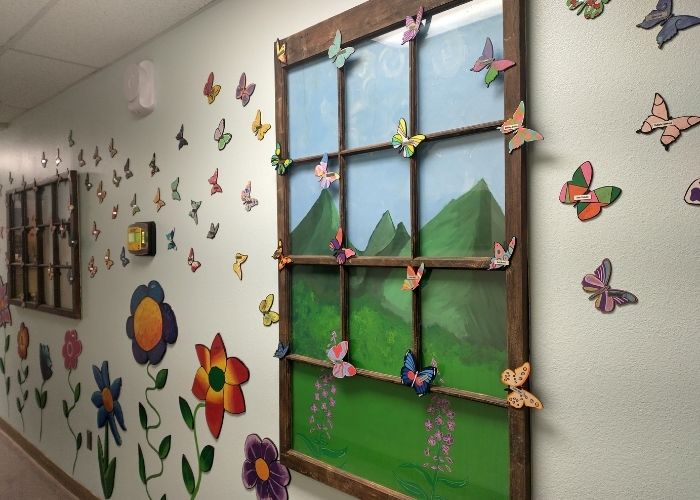
In Kenai, a second memorial wall was painted by one of Hope's very talented supervisors, Whitney Clark (who also designed this year’s Kenai Walk & Roll for Hope t-shirt). This wall was a collaborative effort of the Community Resource Advisory Team and Hope’s office staff to celebrate and commemorate these special and loved individuals in the community.

Agency Vision
Hope introduced the concept of an Agency Vision Board—a unifying framework that outlines key goals and aspirations for the organization. Hope's Vision Boards, updated at the beginning of each year, reflects the agency's ongoing commitment to building a society where people with disabilities live self-directed lives, fully supported and actively included in their communities. The Vision Board focuses on several core themes—building inclusive communities, celebrating joyful events, strengthening community partnerships, advancing advocacy, promoting sustainability, building bridges, and creating a culture of engagement—serving as a shared guidepost for staff, partners, and supporters throughout the year.
The Walk & Roll for Hope—a 56-Year Legacy
More than five decades ago, in 1970, a large and mighty group of Alaskans gathered with a simple hope—to bring people with disabilities back to Alaska after being involuntarily institutionalized out of state. That first Walk for Hope was big, and it carried big dreams. At the time, more than 2,000 Alaskans—including very young children—were living at Morningside Hospital in Oregon, separated from their families, homes, and communities. More than 4,000 people walked 31 miles to raise funds and awareness in support of Hope's initiative to bring them home. Ever since, year after year, rain or shine, the community came together—walking, rolling, cheering, giving—supporting inclusive communities where Alaskans with disabilities can thrive.
Although so much progress has been made, Alaska does not currently have the infrastructure to support all Alaskans with disabilities, and children are still being sent out of state for supports and treatment, so in 2025 Hope dedicated its fundraising to contribute to that infrastructure.
At Hope's 56th Walk & Roll for Hope, more than 200 participants across Anchorage and Kenai came together, and raised over $51,000 to support keeping children with complex medical needs in Alaska by helping to fund essential services, resources, and advocacy efforts.
Hope's Executive Director, Michele Girault, said, "I began my Walk for Hope journey 40 years ago and have decades of memories tied to the first Saturday in May. I am so grateful for the thousands who remember fondly their trek across Anchorage and contributed to building a community where Alaskans with disabilities and their families are valued and supported, by walking, rolling and contributing—what a difference has been made!"
After careful consideration, Hope made the decision to retire the Walk & Roll for Hope. Its legacy is reflected in the thousands of Alaskans who have participated and the many lives positively impacted by the awareness and funding it generated. As the organization moves forward, new events and opportunities are being developed to continue advancing Hope’s mission and responding to the evolving needs of the community.
Kodiak Recreation Center
Hope's Kodiak team held a grant opening of its Emerald Island Recreation Center, and by 2023, it had become a vibrant part of the community. The Center offered a wide array of recreational opportunities, including culinary classes featuring produce from their garden, and activities such as swimming, bowling, quilting, sewing, cooking workshops, aerobics, stretching, and art and photography classes.
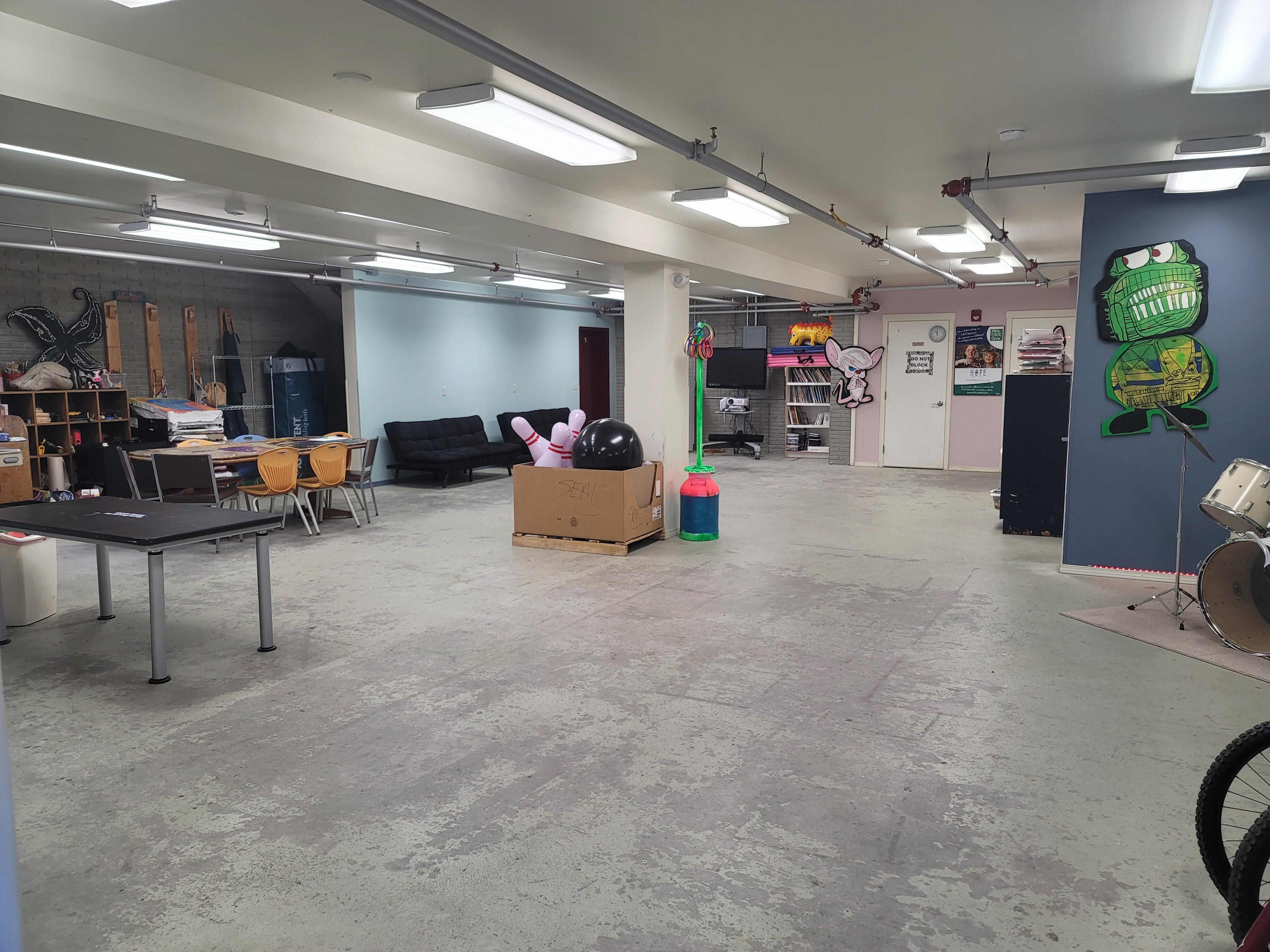
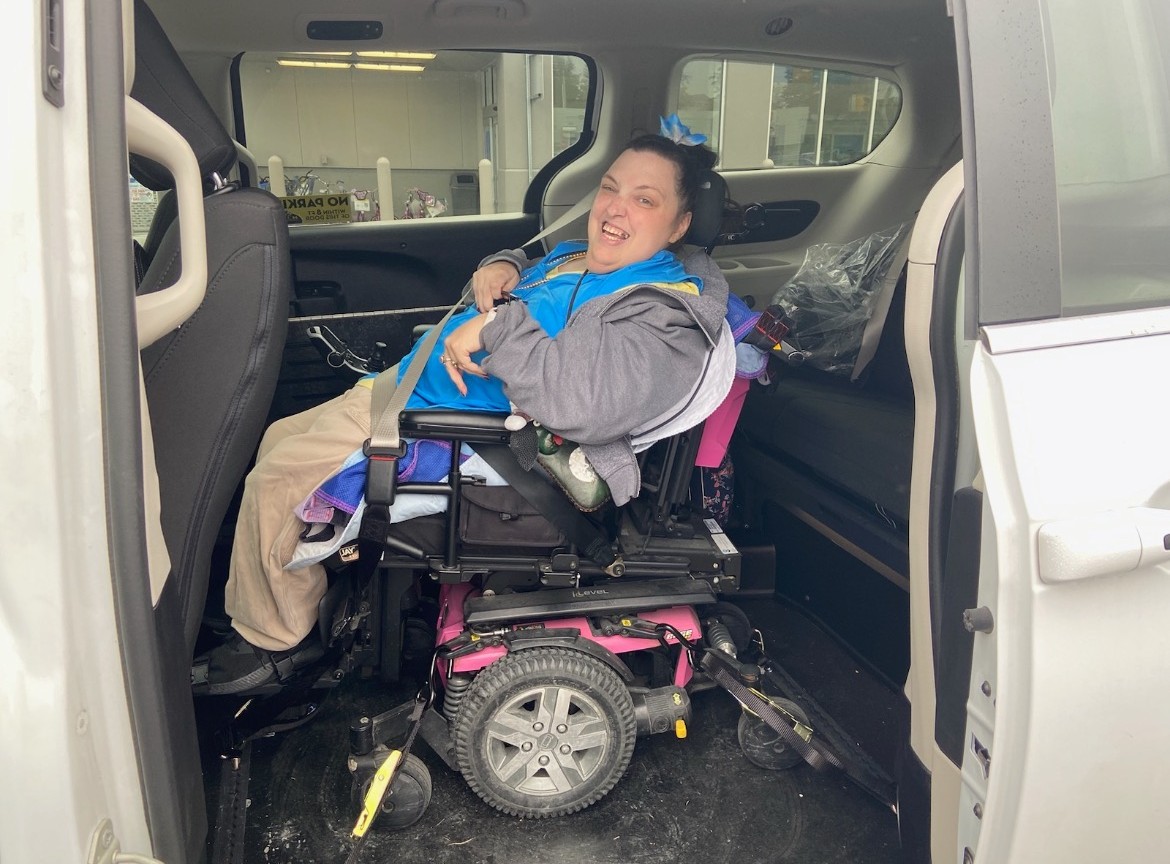
Community members can check out recreational equipment such as kayaks, paddle boards, bicycles, tricycles, and fishing poles. Generous grant funding from the Kodiak Island Borough and the City of Kodiak have helped support respite and recreational programs, as well as the maintenance and improvement of the Center. The programming focuses on building skills in community inclusion, safety, and health, addressing critical local needs.
In 2024, the Kodiak team came together to provide a new wheelchair-accessible van for the region, a meaningful addition that brought joy and increased mobility to many. That October, Hope partnered with Alaska Health Fair to host a Health Fair in Kodiak, offering accessible health and wellness resources to the community. The Emerald Island Recreation Center continues to serve as a central hub for events and classes, thanks to the generous support of the Kodiak Island Borough and the City of Kodiak.
Grant-Funded Impact across Alaska
Hope has received significant support through various grant-funded initiatives, helping to expand services, pilot innovative programs, and strengthen community-based supports across the state. These grants have enabled Hope to address unmet needs in both urban and rural areas—improving access to care, increasing community engagement, enhancing the safety and accessibility of properties, and supporting the health and well-being of people who choose Hope's services.
With the support of donors and grant partners, Hope has created more opportunities for people and families who receive supports but don’t have traditional funding. Hope is supporting more children and young adults in its Community Engagement programs including Summer Camp, Discovery Center classes, and Hope Studios. Grants and donations have enabled significant renovations and maintenance to Hope-owned assisted living homes, which are costs not covered by Medicaid. Every achievement, big or small, represents a meaningful step towards empowering people who experience disabilities to live more independent and fulfilling lives.
Rasmuson Foundation
A major grant from the Rasmuson Foundation funded the revitalization of 30 assisted living homes, including essential maintenance and upgrades. These projects were further supported by two cohorts of AmeriCorps volunteers, who completed painting, deck and ramp replacements, lawn and garden updates, debris removal, and more. The Foundation continued its support by funding additional facility improvements, such as new flooring and baseboards, interior and exterior painting, drywall repairs, sprinkler system installations, plumbing and electrical updates, and full bathroom remodels. The Foundation's support also enabled Hope to buy out the leases on two accessible fleet vehicles, which remained essential for transporting residents to medical appointments, errands, and community events.
Alaska Community Foundation
During the pandemic, the Alaska Community Foundation helped administer local, state, and federal financial relief programs that provided personal protective equipment, training resources, and sanitation supplies. Revenue replacement funds from these programs helped Hope avoid layoffs and benefit reductions. The Foundation also provided direct funding for board development, summer camps, and other organizational needs.
A joint grant from the Alaska Community Foundation and the Rasmuson Foundation funded the full return of the Discovery Center Summer Camp, offering scholarships that enabled 23 new campers to attend for the first time. The Foundation supported the Community Engagement Summer Camp, which served 34 children over ten weeks with educational themes like wildlife, ceramics, dance, and water activities, concluding with a joyful talent show.
Mat-Su Health Foundation
The Mat-Su Health Foundation provided critical support for infrastructure and services in the Mat-Su Valley. After the Willow Ranch barn roof was damaged by snow in 2021, a grant from the Foundation funded essential repairs and the purchase of a wedge snowplow to help staff maintain safety during the winter.
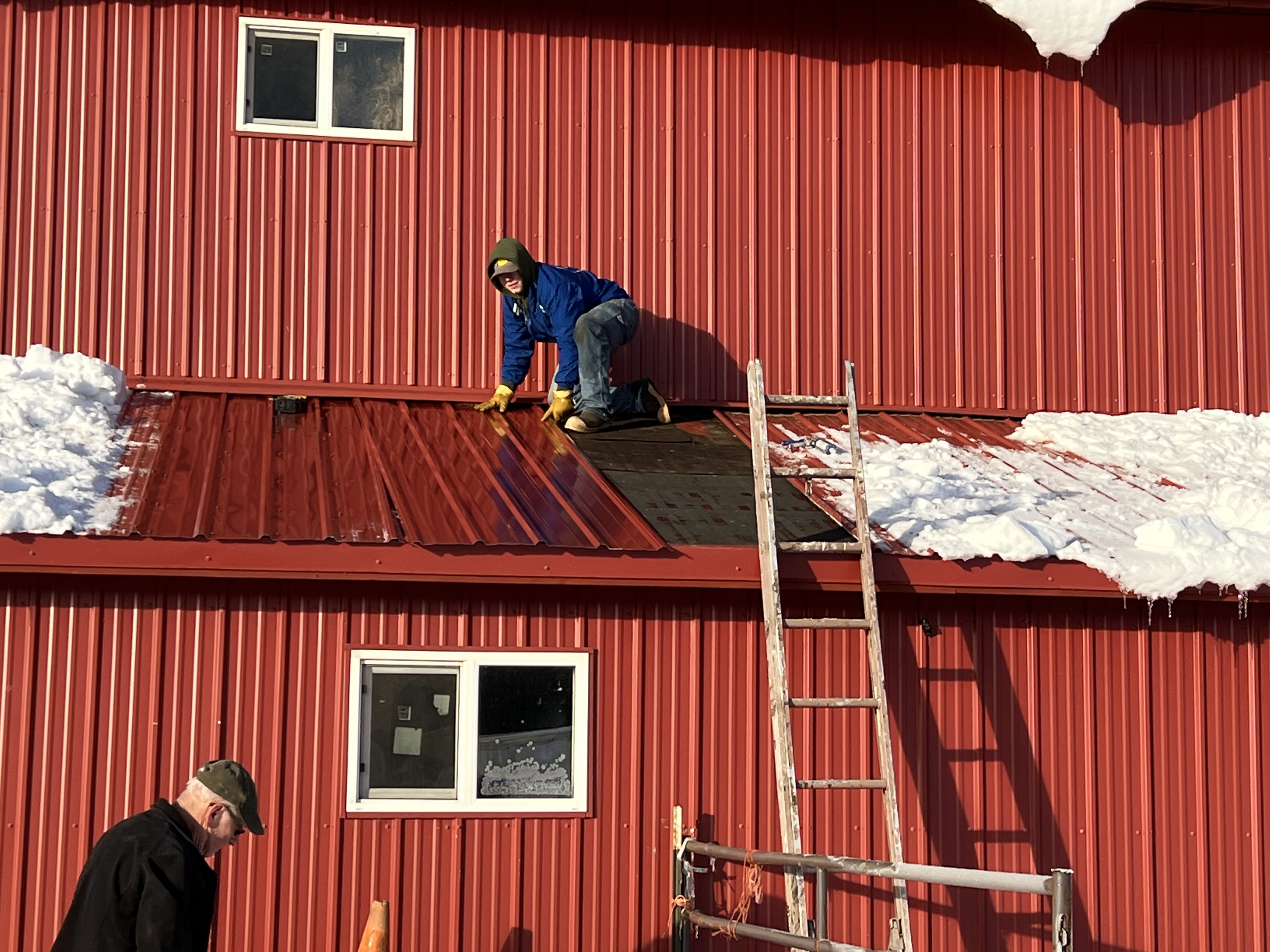
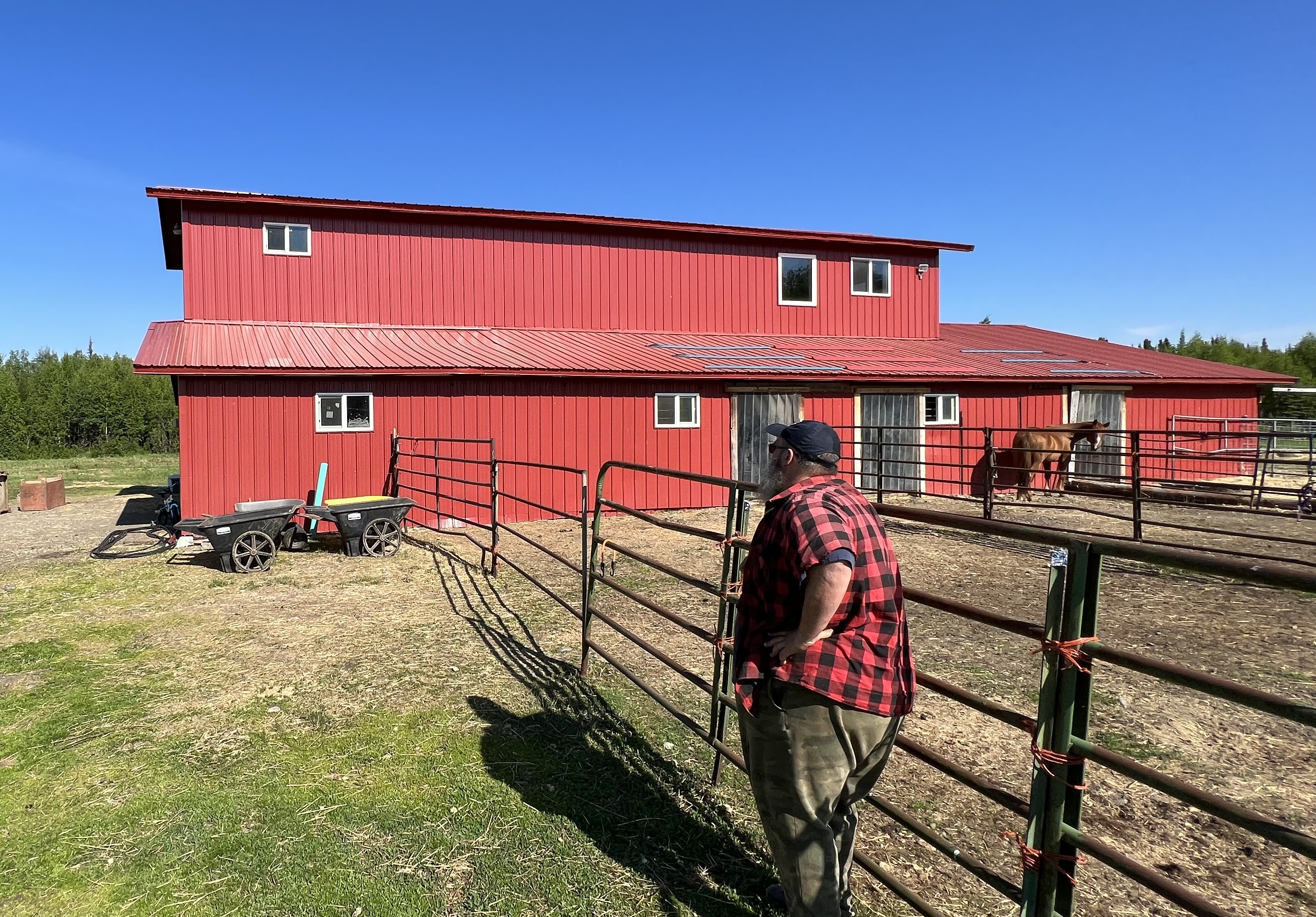
In 2024, the Foundation supported improvements across five assisted living homes through the installation of stationary power generators. A full remodel of the “Farm Loop” home in Palmer was also funded, resulting in upgraded windows, lighting, flooring, doors, and accessibility features. A private, dedicated living space for the Resident Manager was added, enhancing comfort and privacy for staff.
Reitman Family Trust
In 2024, a generous grant from the Reitman Family Trust funded a full renovation of “Sandy Place,” a home in Anchorage that was significantly damaged by the 2018 earthquake. The project included foundation leveling, the installation of a sump pump, sprinkler system upgrades, and accessibility improvements. Interior renovations included new flooring, lighting, kitchen countertops, appliances, and remodeled bathrooms—resulting in a safer, more comfortable, and welcoming space for residents and staff alike.
Project Homestead
Our Willow Ranch property was featured in a 2024 video production titled Project Homestead, highlighting upgrades to the property. The production was generously donated and created by Midea. Located on 70 acres, the Ranch serves as a subsistence-supported living home for four gentlemen and is managed by Frank Forpahl and Gena Coleman, a dedicated husband-and-wife team. The renovations included adding insulation, new ductwork, new windows, a modern heating system, updated appliances, and a cozy fire pit on the patio. These improvements brought new life to the Ranch, reduced living costs, and positively impacted the residents’ quality of life.
Special Visit from Zack Gottsagen
Zack Gottsagen, the star of The Peanut Butter Falcon, paid a very special visit to our Discovery Center and Art Studio. He was joined by his parents and staff from the Trust Training Collaborative, who presented at the Full Lives Conference—where Zack delivered the keynote speech. Zack made a lasting impression on everyone. It was an honor to meet him and share more about Hope and Hope's community with him. As a special thank you, Hope Studio artists presented him with a handmade falcon art piece.
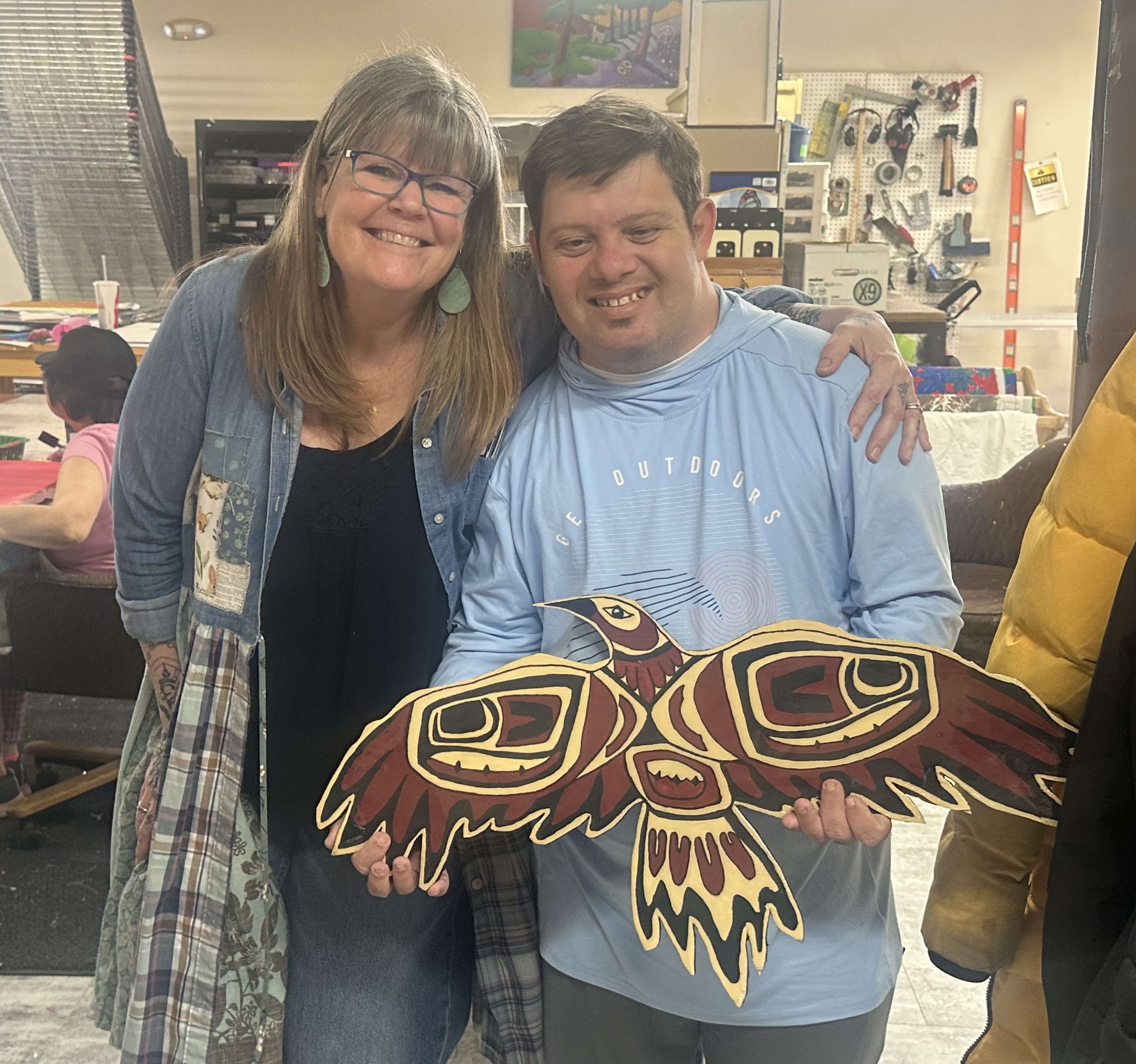
Denali Village
A Vision for a Life-Sharing Community
Planning is underway for Hope's third intentional neighborhood called Denali Village. Denali Village emerged from a shared vision between two families who, wanting to create a meaningful, permanent home for their adult children with intellectual and developmental disabilities, partnered with Hope to bring that dream to life.
Rooted in values of service, mutual respect, and personal growth, Denali Village is an initiative for social change and to create a community where values of service, sharing, spiritual nourishment, and recognition of each person's unique gifts can flourish. Inspired by the Camphill model and the principles of anthroposophy, Denali Village honors the profound worth of every individual, promoting a mindful, inclusive approach to daily life that serves as a model for societal renewal. The community will empower villagers through activities like gardening, arts, and culinary skills, imbuing a sense of purpose and interconnectedness.
Building on the life-sharing values of Camphill, Denali Village will use a non-hierarchical structure where staff and villagers alike contribute to meaningful daily work and artistic expression. Planned features include large gardens, artist studios, a barn, and shared spaces that support both personal growth and community events. Future additions like a cafe and bakery will help Denali Village connect with its surrounding community, bringing a sense of belonging and mutual support beyond its borders.
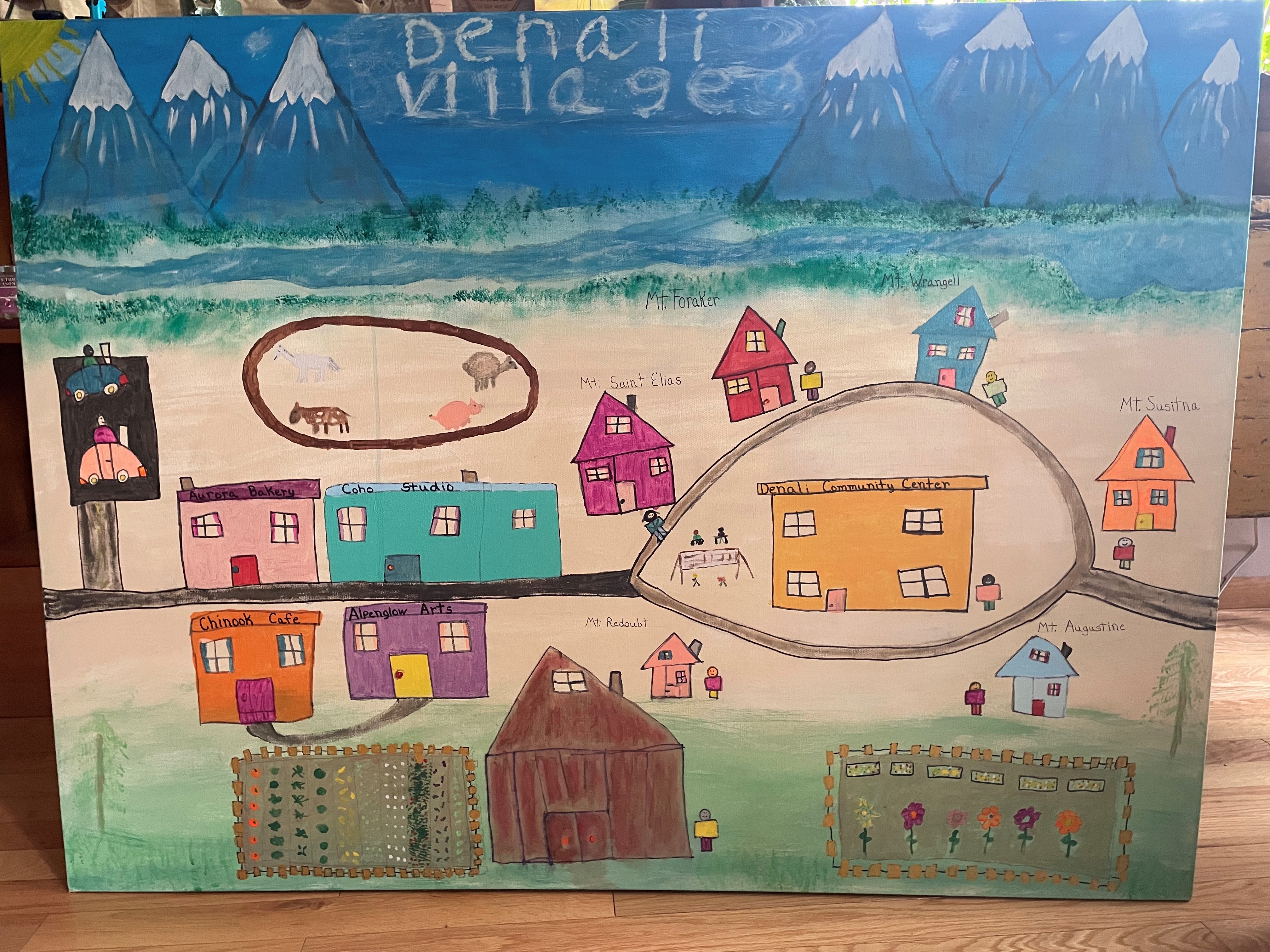
Rendering of Denali Village concept by Jena Crafton
With support from the Alaska Mental Health Trust Authority, Hope advanced architectural planning, engaged design interns, and began preparations to secure land and funding for Phase One of development. The initial phase includes plans for housing 11 residents and 5 staff members, along with shared spaces for meals, gatherings, and creative expression.
The mission of Denali Village is to create wholeness by nourishing social relationships, contributing to the community, and connecting to nature. Through farm life, artistic expression, and culinary arts, each individual may more fully unfold their potential and lead a meaningful life.
Hope needs its community's support to turn this vision into a reality. Financial contributions will help turn this intentional, life-sharing community that honors each person's unique gifts through gardening, artistic expression, and community involvement into a reality. Supporting Denali Village not only funds a project but also invests in a loving, supportive neighborhood for generations to come.
Hope's Ongoing Commitment
Hope remains steadfast in its mission to support people with disabilities in living meaningful lives. Diversity, equity, and inclusion are foundational to strong communities. Inspired by the words of Mr. Rogers—“Our job in life is to help people realize how rare and valuable each one of us really is”—Hope will continue to champion a world where every person is seen, appreciated, and supported in reaching their full potential.


